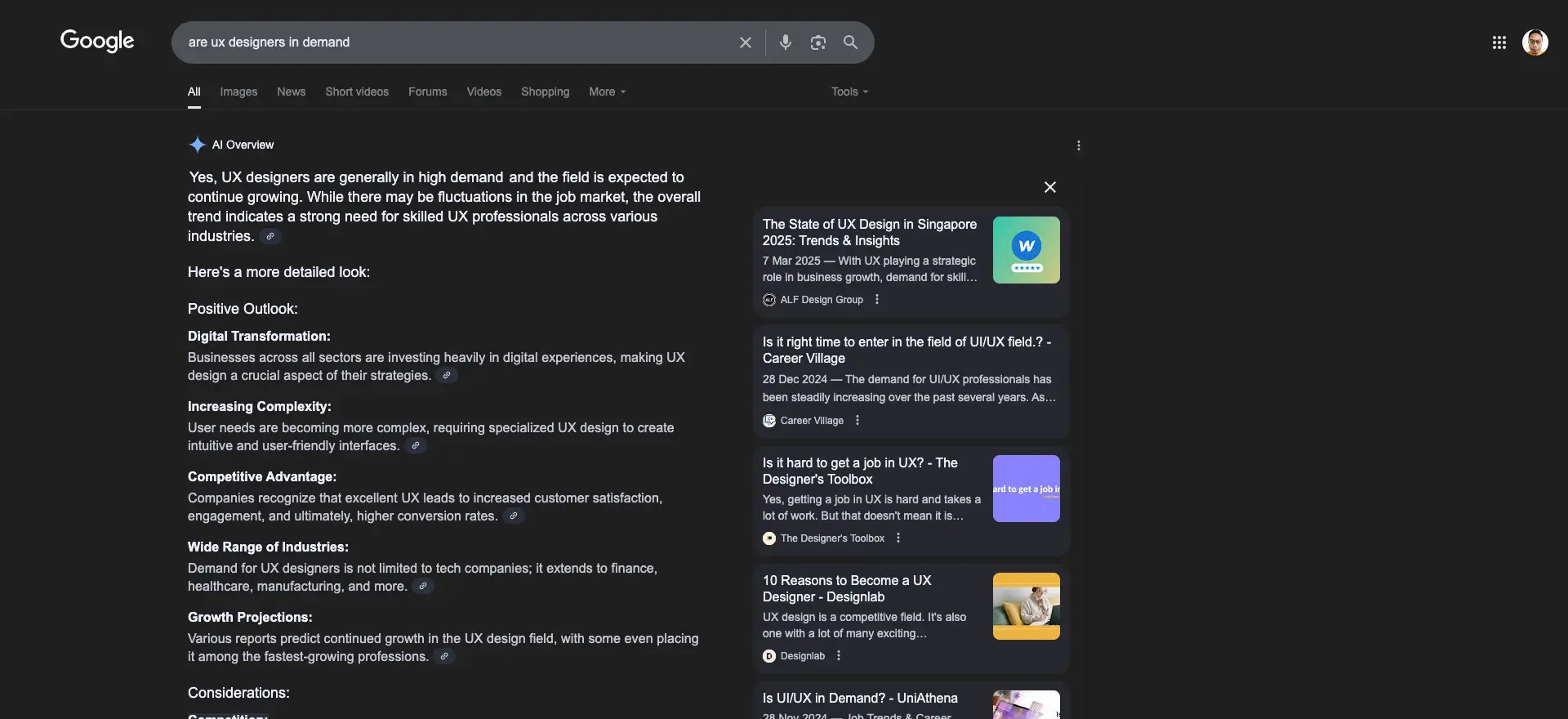The Future of SEO: What Businesses in Singapore Need to Know

Table of contents
Search engines — and how we optimise for them are evolving faster than ever.
In 2025, SEO is no longer just about stuffing keywords and building backlinks. For businesses in Singapore, staying ahead means embracing change: artificial intelligence (AI), privacy regulations, mobile-first experiences, and hyper-local targeting are becoming central pillars of successful SEO strategies.
As a leading Web Design Agency in Singapore, we’ve seen how the landscape has shifted dramatically. This guide will break down where SEO is heading, what it means for businesses in Singapore, and how to prepare.
AI is Transforming Search Behaviour
Google’s Generative Search is Changing the Game
With the rollout of Google's Search Generative Experience (SGE), AI now plays a prominent role in delivering answers to users instantly—before they even click on a website. For Singaporean businesses, this means your content must:
- Be structured clearly (think FAQs, how-tos, listicles)
- Provide original insights and data
- Focus on EEAT: Experience, Expertise, Authority and Trustworthiness
Search results are becoming less about blue links and more about rich content snippets. The goal? Be the content that AI chooses to feature.
Embracing AI-Powered Content Creation—With Caution
AI tools like ChatGPT and Jasper can speed up content production, but blindly relying on them is a risk. Google rewards human-first, helpful content. In Singapore’s diverse market, businesses must ensure:
- Content is localised for Singaporean context
- Writing is accurate, fact-checked and tailored to user intent
- AI tools support human creativity, not replace it
Tip: Use AI to assist, not automate. Tools like SurferSEO or Clearscope can help optimise, but content should feel human.
Search Isn’t Just On Google Anymore
For younger audiences, Google isn’t the first stop.
TikTok, YouTube, and even ChatGPT have become search engines in their own right. A Gen Z consumer looking for a new restaurant might not search on Google at all.
Instead, they might type “best cafes in Tanjong Pagar” into TikTok and watch recommendations from influencers.
This shift is changing SEO strategy. If your business relies only on ranking high on Google, you’re missing out on potential customers who never search there.
To stay relevant:
- Optimise content for TikTok and YouTube using captions, hashtags, and engaging descriptions
- Create short-form video content with clear, concise messaging
- Adapt keywords to match how people search on different platforms

Fewer Clicks, More Visibility
Even when users search on Google, they don’t always click through to a website.
Zero-click searches — where the answer appears directly in the search results — are becoming more common. Google’s AI-generated answers, featured snippets, and knowledge panels pull key information, meaning users get what they need without leaving the search page.

This doesn’t mean SEO is dead. It means businesses need to shift focus. Instead of relying on organic traffic, the goal should be visibility.
To improve search presence:
- Optimise content for featured snippets by answering common questions directly
- Use structured data to help search engines understand your content better
- Make content easy to scan by using bullet points, numbered lists, and clear subheadings
Great web UX and web UI aren’t just about aesthetics. They play a direct role in SEO performance. A well-structured website with clear navigation and responsive web design keeps users engaged and improves rankings.
UX and SEO Are Now Intertwined
Core Web Vitals are Ranking Factors
In the past, SEO focused heavily on keywords and backlinks.
A slow-loading site, clunky navigation, or intrusive pop-ups will hurt your rankings. Google checks on:
- Largest Contentful Paint (LCP) - page load speed
- First Input Delay (FID) - interactivity
- Cumulative Layout Shift (CLS) - visual stability
Think about your own experience online. If a website takes too long to load, you leave. If the navigation is confusing, you don’t bother searching for information. Google tracks these behaviours. If users frequently bounce from your page, your rankings drop.
To improve user experience:
- Compress images and use efficient coding to improve page speed
- Simplify navigation so users find what they need quickly
- Ensure your site is mobile-friendly, as most searches happen on smartphones
Local SEO is More Important Than Ever
Google Business Profile Is a Must-Have
More searches are location-based. Someone looking for a hair salon, gym, or café in Singapore isn’t just searching for “best hair salons.” They’re searching for “best hair salons near me” or “best hair salons in Orchard.”
Google prioritises local results for these searches. To rank higher for local searches:
- Keep your Google Business Profile updated with accurate details
- Encourage customer reviews and respond to them to build trust
- Use location-based keywords in website content, meta descriptions, and titles
If your web development strategy doesn’t consider local search, you’re missing out on potential customers in Singapore.
Targeting Long-Tail Keywords with Local Intent
Instead of broad terms like "web design", target:
- "web design agency singapore"
- "ux design agency in singapore" and etc.
Search Is Becoming Visual and Conversational
Video, Visuals and Voice Search are Rising
Singaporeans increasingly use visual platforms like YouTube and TikTok to discover products and services.
- Embed videos on key landing pages
- Optimise images with alt text and schema markup
- Consider voice search keywords
Schema markup is also becoming more important to structure your content for machines.
UX Writing Matters
Microcopy (button labels, error messages, menus) impacts both user flow and search rankings. Clear, helpful, action-oriented UX copy supports engagement — another SEO signal.
The Future of SEO is Privacy-Driven
The way businesses collect data is changing.
Data Protection Is a Growing Concern in Singapore
With PDPA (Personal data Protection Act) updates and global GDPR trends influencing Singapore law, Google is rewarding secure, transparent websites.
- Use HTTPS
- Create transparent privacy policies and cookie banners
- Limit unnecessary tracking scripts
First-Party Data is the New Gold
As third-party cookies disappear, focus on collecting first-party data:
- Focus on first-party data collection through newsletters, surveys, and direct engagement
- Be transparent about how you collect and use data to build consumer trust
- Email opt-ins
SEO is Evolving, But The Fundamentals Remain

The future of SEO isn’t about tricking algorithms. It’s about adapting to how people search, consume content, and engage with businesses.
Search engines will continue to evolve, but the core principles stay the same:
- Content must be valuable, unique, and built on expertise
- Search visibility extends beyond Google — multi-platform optimisation is key
- User experience directly affects rankings — fast, mobile-friendly sites perform better
- Local SEO keeps businesses visible to those searching nearby
SEO isn’t dying. It’s shifting. Businesses that stay ahead of these changes will continue to be found — no matter where or how people search.
Frequently Asked Questions (FAQ)
1. Why is SEO still important for businesses in Singapore in 2025?
With increasing online competition, SEO remains essential for discoverability. Strong SEO ensures visibility across local search, AI-powered results, and mobile devices.
2. How is AI changing SEO practices for Singapore businesses?
AI is shifting SEO toward intent-based, conversational content. Businesses must create helpful, human-centred content that addresses user needs directly.
3. What are Singapore-specific SEO strategies companies should adopt?
Focus on localised content, optimise for Singaporean spelling and language, list on Google Business Profile, and acquire backlinks from Singapore-based sites.
4. Is Webflow good for SEO in Singapore?
Yes. Webflow offers performance-driven SEO features ideal for Singapore’s mobile-first market, including fast loading, semantic code, and full on-page control.
5. How long does it take to see SEO results in Singapore?
Typically 3–6 months depending on keyword competition, content quality, and backlink acquisition.
6. Do I need to hire an SEO agency in Singapore, or can I do it myself?
DIY is fine to start, but a specialised agency like ALF Design Group ensures deeper local strategy, technical optimisation, and long-term growth.
Conclusion
SEO and web development go hand in hand. A well-structured website, strong web UX, and smart SEO strategy work together to keep your business visible online.
At ALF Design Group, we help businesses in Singapore build high-performing websites that meet modern SEO standards. Get in touch today to future-proof your online presence.
{{build-better-experience="/directory"}}
Related Articles

What Is Responsive Web Design and Why It Matters in 2026
Responsive web design in 2026 is about more than layouts. Learn why mobile-first UX now drives rankings, trust, and conversions.

Web Design Trends in 2024
Let's dive into the web design trends that us designers are looking at in 2024.

AI SEO Audit Checklist: Prepare Your Website for 2026
A future-proof SEO audit checklist designed for AI search, answer engines, and smarter ranking systems in 2026.
Launch Your Next Website.
Ready to elevate your online presence with a trusted web design agency in Singapore?


.webp)